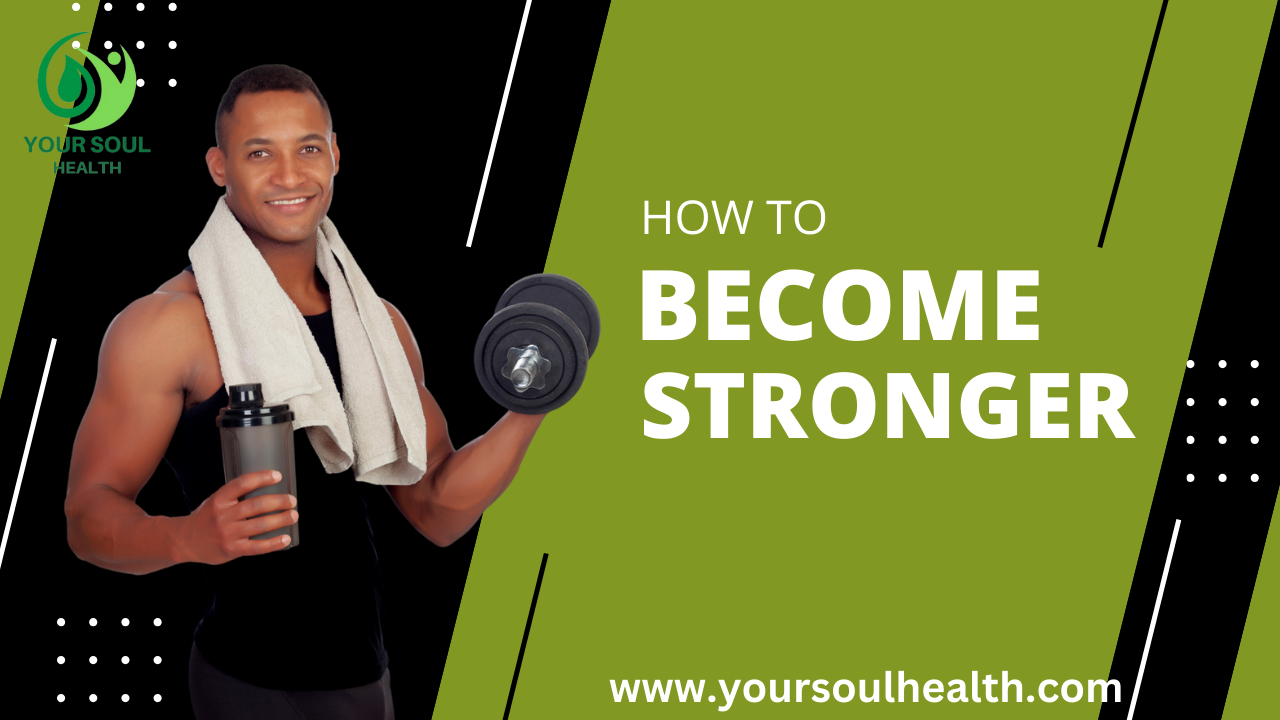Discover effective techniques and strategies on how to become stronger both physically and mentally. To become stronger, engage in regular strength training and follow a balanced diet rich in protein. Developing physical strength requires consistent effort and a commitment to challenging yourself both physically and mentally.
By focusing on progressive overload in your workouts and fueling your body with nutritious foods, you can build muscle, increase endurance, and enhance overall strength. Building strength is a gradual process that requires dedication, perseverance, and patience. Incorporating a variety of exercises that target different muscle groups and allowing for proper rest and recovery are essential components of a successful strength training regimen.
With determination and a well-rounded approach, you can achieve your strength goals and improve your physical performance.

The Importance Of Inner Strength
When it comes to becoming a stronger individual, the importance of inner strength cannot be overstated. Inner strength is the foundation upon which self-confidence, resilience, and mental toughness are built. Cultivating inner strength is an essential component of personal growth and development.
Self-confidence is the conviction that one’s skills and judgment are sound. It is the cornerstone of inner strength, enabling individuals to face challenges with conviction and assertiveness. With a strong sense of self-confidence, individuals are more likely to take risks, pursue their goals, and overcome setbacks.
Resilience is the capacity to overcome hardship and carry on in the face of challenges. Inner strength fosters resilience, allowing individuals to navigate through difficulties with a sense of determination and optimism. Building resilience through inner strength enables individuals to embrace setbacks as opportunities for growth.
Mental toughness is the capacity to stay focused, motivated, and determined in the midst of challenges. Inner strength serves as the bedrock of mental toughness, empowering individuals to maintain their composure and resolve in high-pressure situations. Through the cultivation of inner strength, individuals can develop the mental fortitude needed to tackle demanding tasks and emerge stronger.
Understanding Your Inner Power
Understanding Your Inner Power is essential in the journey of becoming stronger. As you delve into your self-awareness, emotional intelligence, and personal values, you unlock the key to harnessing your true strength.
Self-awareness
Self-awareness enables you to recognize your thoughts, emotions, and behaviors. By understanding yourself on a deeper level, you can identify areas for growth and improvement.
Emotional Intelligence
Emotional intelligence is the ability to manage your emotions effectively and understand the emotions of others. Developing this skill can enhance your relationships and resilience.
Personal Values
Personal values are the tenets that direct your choices and behavior. When you align your choices with your values, you empower yourself to live a more authentic and fulfilling life.
Building Physical Strength
Building physical strength is an essential part of living a healthy and active lifestyle. Whether you want to improve your overall fitness, increase your muscle tone, or simply feel stronger in your daily activities, developing physical strength is a goal that is achievable for everyone. By focusing on three key aspects – exercise and fitness, nutrition and diet, and rest and recovery – you can effectively build up your physical strength and reach your desired level of strength and fitness.
Exercise And Fitness
Regular exercise is the cornerstone of building physical strength. Engaging in a variety of exercises that target different muscle groups can help you build muscle and increase your overall strength. Here are some important things to remember:
- Vary your workouts to target different muscle groups and prevent plateaus.
- Incorporate both cardiovascular exercises and strength training exercises into your routine.
- Start with light weights and gradually increase the intensity as your strength improves.
- Include compound exercises, such as squats, deadlifts, and bench press, as they work multiple muscle groups at once.
Nutrition And Diet
A balanced and nutritious diet is crucial for building physical strength. Your body needs the right fuel to repair and build muscles. Consider the following tips:
- Ensure you consume adequate protein to support muscle growth and repair. Good sources of protein include lean meats, poultry, fish, eggs, and dairy products.
- Incorporate a variety of fruits, vegetables, and whole grains into your diet to provide essential vitamins, minerals, and energy.
- Stay hydrated by drinking plenty of water throughout the day, especially during and after exercise.
- Avoid or limit processed foods, sugary snacks, and drinks as they can hinder your progress and negatively impact your overall health.
Rest And Recovery
Rest and recovery are often overlooked but are equally important for building physical strength. Giving your body time to rest and repair after workouts is essential for muscle growth. Here are some key points to remember:
- Include rest days in your workout routine to allow your muscles time to recover and prevent overtraining.
- Get an adequate amount of sleep each night to support muscle repair and overall recovery.
- Listen to your body and take breaks when needed to avoid injuries and burnout.
- Incorporate stretching and foam rolling into your routine to reduce muscle soreness and improve flexibility.

Developing Mental Strength
Developing mental strength involves cultivating resilience and fortitude to overcome challenges and setbacks. By building a positive mindset, practicing self-care, and seeking support, you can become emotionally resilient and stronger mentally.
Positive Thinking
Positive thinking plays a crucial role in developing mental strength. It involves consciously choosing to focus on the positive aspects of any situation, no matter how challenging it may be. By embracing a positive mindset, individuals can train their brains to see opportunities rather than obstacles. This can have a profound impact on overall mental well-being and resilience. Staying positive can help reduce stress, increase self-confidence, and improve problem-solving abilities.
Mindfulness and Meditation
Mindfulness and meditation are powerful practices that can help cultivate mental strength. Being mindful entails accepting the present moment as it is, without passing judgment. It allows individuals to observe their thoughts and emotions objectively, which can lead to greater self-awareness and emotional regulation. Meditation, on the other hand, involves intentionally focusing the mind on a specific object or activity. It encourages relaxation and mental calmness.
Practicing mindfulness and meditation regularly can improve concentration, increase cognitive flexibility, and reduce anxiety and depression. By taking the time to quiet the mind and tune into the present moment, individuals can develop a stronger ability to navigate through life’s challenges with clarity and resilience.
Stress Management
Stress is a part of life, but learning how to manage it effectively is crucial for developing mental strength. Stress management techniques can help individuals cope with daily stressors and prevent it from overwhelming their mental well-being. Strategies such as exercise, deep breathing, and time management can significantly reduce stress levels.
Frequent exercise releases endorphins, which are organic mood enhancers. It not only improves overall physical health but also enhances mental well-being. Deep breathing exercises are simple techniques that can be practiced anywhere, anytime, to help calm the mind and reduce stress. Learning to prioritize and manage time effectively can also alleviate stress, enabling individuals to focus on tasks without feeling overwhelmed.
In conclusion, developing mental strength involves fostering positive thinking, practicing mindfulness and meditation, and incorporating stress management techniques into daily life. By embracing these practices, individuals can enhance their resilience, improve their overall well-being, and navigate through life’s challenges with greater confidence and inner strength.

Cultivating Emotional Strength
Emotional strength is a vital component of overall strength and resilience. It allows us to navigate life’s challenges with grace and to maintain positive mental well-being. Cultivating emotional strength requires self-awareness, empathy, and a willingness to embrace vulnerability. By focusing on these key areas, you can develop a solid foundation for emotional strength and thrive in all aspects of your life.
Embracing Vulnerability
Vulnerability often carries a negative connotation, but it is an essential part of cultivating emotional strength. When we are vulnerable, we allow ourselves to be authentic and open, which fosters deeper connections with others. Embracing vulnerability means being willing to let others see our true selves, including our fears, insecurities, and uncertainties.
This openness allows for genuine relationships to blossom and can lead to personal growth. It takes courage to be vulnerable, but the rewards are immense. Vulnerability enables us to lean into discomfort, embrace change, and learn from our experiences.
Managing Emotions
Effective management of emotions is another crucial aspect of cultivating emotional strength. It involves developing the ability to acknowledge and understand our emotions without being overwhelmed by them. By acknowledging our emotions, we can create space for self-reflection and personal growth.
Managing emotions also means finding healthy outlets for expressing our feelings. Engaging in activities such as journaling, exercise, or talking with a trusted friend or therapist can help us process and release emotions in a constructive way.
Building Empathy
The capacity to comprehend and feel another person’s emotions is known as empathy. It is an integral part of emotional strength as it allows us to form deeper connections and foster compassion. Building empathy involves actively listening and seeking to understand the perspectives and experiences of others.
Practicing empathy also means being non-judgmental and supportive towards others. It requires setting aside our own biases and preconceived notions to truly connect and relate to the emotions of others. By building empathy, we can develop stronger relationships and contribute to a more compassionate and understanding world.

Credit: www.amazon.com
Overcoming Obstacles
To achieve greater strength, one must learn to overcome obstacles. By confronting adversity and setbacks, facing fears, and turning challenges into opportunities, individuals can build resilience and fortitude. Each obstacle presents a chance for personal growth and development, providing the opportunity to emerge stronger than before.
Adversity And Setbacks
Adversity and setbacks are inevitable in life. They test our resolve and determination, often appearing as insurmountable barriers. However, it is through these experiences that we can hone our strength. Each challenge offers the opportunity to develop resilience and determination, crucial traits for overcoming obstacles.
Facing Fears
Facing fears is a significant part of becoming stronger. Confronting our fears helps to expand our comfort zone, allowing us to realize our true capabilities. By overcoming fears, we cultivate courage and confidence, essential attributes for personal growth and strength.
Turning Challenges Into Opportunities
Every obstacle offers an opportunity for development and advancement. By reframing our mindset, we can transform seemingly insurmountable obstacles into stepping stones toward success. Through determination and perseverance, we can harness the power of challenges and use them as opportunities to thrive and become stronger.
Empowering Relationships
Empowering Relationships are crucial for personal growth and inner strength. Strong, meaningful connections with others can provide invaluable support, encouragement, and understanding. Building and nurturing empowering relationships enables individuals to develop resilience, confidence, and a sense of belonging.
Building Supportive Networks
Creating a supportive network of friends, family, and like-minded individuals is essential for personal strength. Embrace a community of positive and inspiring people around you. Seek out people who share your values and empower you to reach your full potential.
Setting Boundaries
Establishing clear and healthy boundaries within relationships is vital for self-empowerment. Ensure that you communicate your needs and limitations effectively. Be firm in maintaining boundaries that align with your values and well-being, fostering strong, respectful connections.
Effective Communication
Open, honest communication is the cornerstone of empowering relationships. Prioritize active listening and expressing yourself with clarity and empathy. Practice assertiveness while respecting the perspectives of others, nurturing trust and understanding in your interactions.
Tapping Into Spiritual Strength
Finding Purpose And Meaning
Discover why you exist and what drives you forward. Connect with a purpose that fuels your strength.
Practicing Gratitude
Cultivate a heart of thankfulness for life’s blessings and challenges. Embrace gratitude as a path to inner strength.
Connectivity And Belief Systems
Build connections with others who share your beliefs and values. Strengthen your spirit through communal faith.

Credit: www.inc.com
Frequently Asked Questions Of How To Become Stronger
How Can I Increase My Strength?
To increase your strength, focus on resistance training exercises like weightlifting and bodyweight exercises. Eat a balanced diet with sufficient protein, carbs, and healthy fats. Allow your muscles to strengthen and heal by getting enough sleep and recuperation time. Consistency is key for long-term strength gains.
How Can I Become More Stronger?
To become stronger, focus on regular exercise, including resistance training and bodyweight exercises. Also, ensure a balanced diet rich in protein, healthy fats, and complex carbohydrates. Prioritize good sleep, manage stress, and stay hydrated to support overall strength and fitness.
What Are 5 Ways To Get Stronger?
To get stronger, focus on strength training, such as weightlifting. Eat a balanced diet rich in protein. Get enough rest and sleep for muscle recovery. Stay hydrated and maintain proper form during workouts. Stay consistent with your exercise routine.
How To Get Stronger In 30 Days?
Follow this 30-day plan to get stronger: 1. Start a strength training program combining resistance exercises. 2. Gradually increase the intensity and frequency of your workouts. 3. Fuel your body with a balanced diet, including protein and healthy carbs. 4. Get enough sleep and rest to support muscle growth.
5. Stay consistent and track your progress to stay motivated.
Conclusion
Overall, building strength is a journey of consistency and dedication. By incorporating proper techniques, nutrition, and mindset, anyone can achieve notable gains. Remember, progress takes time, so stay patient and focused on your goals. With perseverance and resilience, you can truly transform your physical and mental strength.

I am a health writer and blogger based in the US and UK. I have been with the health department for six years. And I give advice on various health problems and solutions. I have a lot of experience in health matters and I share it here.

